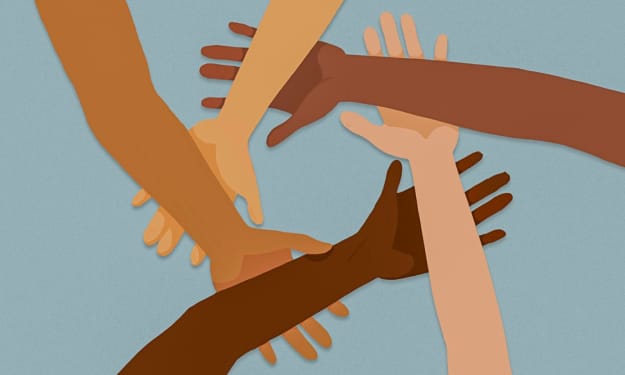Understanding Trauma Bonding
How to Recognize and Break Free from the Cycle of Abuse

When we think of bonding with someone over a shared trauma, we might assume that it is a good thing. However, that is not always the case. Trauma bonding is a phenomenon that occurs in toxic and abusive relationships. It is a deep emotional attachment that forms between a victim and their abuser. Trauma bonding makes it difficult for the victim to leave the relationship, as they mistake the intense feelings they have for their abuser as love and commitment. Here are some signs to look out for to identify a trauma bond and how to break free from it.
1. The other person is outwardly charming
Abusive relationships can be insidious, and they often begin with a facade of charm and kindness. Abusers can be manipulative and cunning, using their charm to lure victims into their trap. It can be challenging for victims to recognize the signs of abuse, especially when the abuser seems trustworthy and caring. However, it is crucial to remember that abusive behavior is never acceptable, no matter how charming the abuser may seem. If someone appears too good to be true, it is essential to be vigilant and aware of any warning signs of abuse.
2. They are emotionally unpredictable
Emotional manipulation is a common tactic used by abusers to control their victims. They may devalue their victim, making them feel worthless and powerless, only to then shower them with kindness and apologies. This cycle of abuse can make it difficult for victims to leave as they may hold onto the hope that the abuser will change. However, it is important to recognize that this behavior is not a sign of love or affection, but rather a way for the abuser to maintain power and control over their victim. It is important for victims to seek support and resources to safely leave the abusive situation.
3. They tend to take their problems out on you
Abusive relationships come in many forms and can be difficult to recognize. One common sign of an abusive relationship is when your partner, friend, or family member takes their problems out on you and uses you as their psychological punching bag. This behavior is not healthy and can cause emotional harm to the victim. If you experience this type of behavior from someone close to you, it's important to seek help and support to address the situation and protect yourself from further harm. Remember that you deserve to be treated with respect and kindness in all of your relationships.
4. They isolate you from your loved ones
One of the tactics that abusers may use is to isolate their victims from their support systems. They may become angry or upset when the victim spends time with anyone other than themselves and try to control who they spend time with. The abuser may also ask the victim to distance themselves from their friends and family, making it harder for the victim to seek help or support. This type of behavior can be incredibly damaging and can leave the victim feeling alone and vulnerable. It's important to recognize these warning signs and seek help if you or someone you know is experiencing this type of abuse.
5. You deny or minimize their abusive behavior
Trauma bonding is a complex psychological phenomenon that occurs when victims of abuse develop an emotional attachment to their abusers. They may feel a sense of loyalty or obligation to their abuser, even though they are being mistreated. This can lead to denial or minimization of the abuser's behavior, as the victim may not want to acknowledge the severity of the situation. By downplaying the abuse, they may feel like they are protecting their abuser or avoiding conflict. However, it's important to recognize the signs of trauma bonding and seek help in breaking free from the cycle of abuse.
6. You constantly make excuses for them
When we are in a relationship, it can be difficult to accept that our partner has done something wrong or hurtful. However, when we consistently make excuses for their behavior and defend them, it may be a sign of a deeper issue. This behavior could be indicative of a trauma bond, which is a strong emotional attachment to someone who is abusive or harmful. In such a bond, the victim may feel unable to leave the relationship, even when they recognize that their partner's behavior is harmful. It is essential to seek help and support to break free from a trauma bond and move towards a healthier, loving relationship.
7. You're becoming more and more emotionally numb
Emotional numbness and detachment are common symptoms of trauma bonding, a phenomenon where a victim of abuse becomes emotionally attached to their abuser. This can make it difficult for the victim to express their emotions and can lead to a sense of disconnection from their own feelings. It is important to recognize the signs of trauma bonding and seek help from a professional therapist or support group to break free from the cycle of abuse. It is never too late to take control of your emotions and regain your sense of self-worth.
8. You're hiding aspects of your relationship from others
Hiding aspects of your relationship from others is not only a sign of trouble but also a red flag for potential abuse. Trauma bonding can occur when a victim becomes emotionally attached to their abuser, making it difficult for them to leave the relationship. This loyalty towards an abusive significant other can lead to defensiveness or anger towards those who try to intervene and help. It's important to recognize the signs of trauma bonding and seek help if you or someone you know is experiencing it. No one deserves to be in an abusive relationship, and there is always a way out.
Breaking free from a trauma bond is not easy, but it is necessary. Victims of trauma bonding need to recognize that they are being abused and seek help. They should confide in a trusted friend or family member, seek professional help, and consider contacting authorities if necessary. Breaking free from a trauma bond requires a lot of strength, courage, and support. Victims need to prioritize their safety, well-being, and healing. They should surround themselves with people who love and support them and seek professional help to recover from the trauma.
In conclusion, trauma bonding is a destructive emotional attachment that occurs in abusive relationships. Victims of trauma bonding often mistake their intense feelings for their abuser as love and commitment. It can be difficult to recognize and break free from trauma bonding, but it is crucial for one's emotional and physical well-being. Seeking help from a trusted therapist or counselor can be an important step in the healing process. It is also important to understand that leaving an abusive relationship can be a complicated and dangerous process, and it may require a carefully crafted safety plan. With the right support and resources, it is possible to overcome trauma bonding and create a life free from abuse.
About the Creator
Izabela Bąk
I'm a passionate business analyst.






Comments
There are no comments for this story
Be the first to respond and start the conversation.